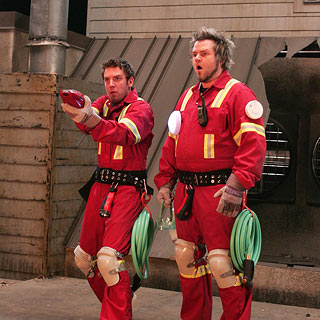
I've just finished reading the two pilot scripts for Life on Mars. One was the 2005 "Amended Pink" draft of the British original, written by co-creators Tony Jordan, Matthew Graham and Ashley Pharoah. The other was the 2007 first draft of the American remake written by David E Kelley and Stu Moss.
("Amended Pink" sounds like one of those drafts producers like to get for free, the revised second draft or the first draft polish.)
The two scripts are incredibly similar. Character names, descriptions and the entire story line of the pilot are the same in both. Many scenes are identical, but for the removal of the heavy British slang in the original, an updating for the technology (blackberries and Google Earth) and some streamlining of the story (which is quite effective for such a small touch).
Life on Mars, if you don't know, is the story of a modern day cop who somehow finds himself back in 1972. I had seen some episodes of the British original but it never grabbed me too much. The dilemma of being back in time was interesting, but I found it emotionally bleak. And emotions that I didn't think were earned. There's a lot of cops punching cops without much build up and men and women getting attracted to each other rather quickly and without reason. It seemed to me at the time.
I may or may not have sort of fast forwarded through a few episodes to try to find out if Sam got back to the future but by now, I don't even remember. I just didn't connect with the story emotionally and didn't end up committing.
But reading the script, I was much much more sucked in oddly. In fact, I read the British version first, the produced version of which I hadn't particularly enjoyed. On paper, I felt the jeopardy and was pulled along with the momentum and emotion of the story which hadn't happened when I watches it. There are a few moments which still don't ring true for me but I enjoyed the read.
The Americanized version is an even faster read, because some of the sub-plotting is gone. But what remains is very similar right down to scene structure and plenty of the dialogue.
I guess the point is very little about this premise needed changing for it to work in the American market. Or maybe that's wrong, because I read that the ABC version of the series is on hold.
Below, a two part video interview with the creators of the original series in which they tell how every broadcaster in the country turned them down, sometimes more than once.
The writers talk about creating the show.

































